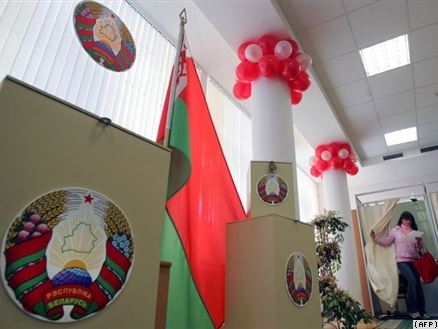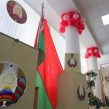
Nineteen Candidates Register For Presidential Election In Belarus
Publication: Eurasia Daily Monitor Volume: 7 Issue: 176
By:

The Belarusian Parliament has scheduled the next presidential elections on December 19. By the deadline to register on September 24, the names of seventeen candidates had been accepted by the Central Election Commission, after two were rejected from the original nineteen. Each candidate required the backing of an initiative group with at least 1,000 signatures. However, in several instances that requirement seems to have been waived.
The largest number of signatures (10,484) was amassed by the leader of the Liberal Democratic Party, Syarhey Haidukevich, who ran in the previous two elections, but is widely considered to be an ally of President, Alyaksandr Lukashenka. The latter has opted to run for a fourth term and his team collected 8,403 signatures.
Among those who are likely to dropout after the second stage of the election process, starting on September 30 till the end of October, are two unemployed men, a pensioner from Minsk, and leader of the Green Party, Yuri Hlushakou, whose supporters could only amass 243 signatures for his initiative group. This stage requires a minimum of 100,000 signatures. As Election Commission Chairperson, Lidziya Yarmoshyna, noted, since 2001, the need to gather so many signatures, as stipulated by the 1994 Belarus constitution, has signified that no more than four candidates could enter the final contest (European Radio for Belarus, September 14).
Regarding the candidates from the opposition, the situation is far from clear. On September 17, the leader of the Movement for Freedom, Alyaksandr Milinkevich, announced that he would not be running because the government has refused to amend the election rules to allow a free and open competition. The head of the Election Commission, Lidziya Yarmoshyna, had stated explicitly that no changes would be introduced (https://by.milinkevich.org, September 17). However, Milinkevich will not boycott the election. Together with candidate Ales Mikhalevich, he has helped to create a “Belarusian Choice” coalition, which unites the Popular Front, Greens, Movement for Freedom, and the Movement for Modernization and has advanced a platform of twelve principles to reform the country, starting with constitutional reform (https://by.milinkevich.org, September 22).
The link between initial signatures collected and subsequent election results is evident. In an analytical article, the editor of Nasha Niva, Andrei Dynko showed how the candidates with the larger initiative groups have performed well in past elections –such as Milinkevich, whose team gathered over 5,000 signatures in 2006 (Nasha Niva, September 24).
This time, the opposition’s leaders based on signatures are as follows: Uladzimir Nyaklayeu (Movement Forward), with over 2,600; Andrei Sannikau (civil campaign European Belarus), 1,831; Ales Mikhalevich (Movement for Modernization), 1,778; Vitali Rymasheuski (Christian Democratic Party), 1,704; Mikola Statkevich (Social Democrats), over 1,500; Yaraslav Ramanchuk (United Civic Party), just over 1,400; and Ryhor Kastusyou (Belarusian Popular Front), 1,307 (Belorusskiy Partizan, September 25).
According to Dynko, Nyaklayeu is in the strongest position among the democratic candidates, while Sannikau, Mikhalevich, and Rymasheuski have some hope of success. However, he maintains, the task of Statkevich, Kastusyou, and Ramanchuk is seemingly impossible (Nasha Niva, September 24). But could any democratic candidate unite the entire opposition?
Nyaklayeu appears to have most resources and funding, reportedly from Belarusian businessmen residing in Russia. A 64-year old poet and former head of the Writers’ Union, he is the leader of the campaign “Speak the Truth.” Formerly he was close to Lukashenka, but left Belarus in 1999, having declared his opposition to the president. He was also detained briefly last May, three months after the formation of the new movement (https://zapraudu.info/article/pra-l-dara). But some oppositionists have referred to him as a “Kremlin agent” (www.naviny.by, September 25) and none agreed to a meeting with him to discuss unity efforts (Belorusy i Rynok, September 25).
An analysis issued on the NTV network offers an alternative possibility, namely that Andrei Sannikau might be a more logical choice (NTV, September 25). Sannikau, a former Deputy Foreign Minister, has the support of Stanislau Shushkevich, the first leader of independent Belarus in 1991-94 and the Popular Front leader in the city of Minsk, Viktar Ivashkevich.
Sannikau also has links to the main opposition newspaper, Narodnaya Volya, and has solid Internet support through the website Charter-97, of which he was a coordinator. That site features an Internet poll indicating that he is leading all candidates, including the incumbent president, comfortably (https://rupoll.com/skvgotwgsp.html) One should note, however, that voting in the poll is not limited to the Belarusian electorate or even residents of Belarus. Moreover, Sannikau is on record as rejecting the notion of a unified candidate (Voice of Russia, August 22).
For the opposition, small campaign teams, an acute lack of funding, potential manipulation of district election commissions, and a generally oppressive environment –the president recently dismissed the opposition collectively as “enemies of the people” (RIA Novosti, Sept 16)– all seem to presage a repeat of past elections. The one imponderable factor is the influence of Russia, which clearly would like to see a change of leader, but has refrained from supporting any of the alternative candidates. Both Sannikau and Ramanchuk have expressed their intention to improve relations with Russia (www.charter97.org, May 14; www.polit.ru, September 20).
Having outlined the economic difficulties facing Belarus, Ramanchuk also declared that Lukashenka could not legitimately win the election in the first round (www.polit.ru, September 20). Milinkevich agrees that the president is considerably weaker than in 2006. But, he asked, “Is the opposition stronger?” and concluded: “Regrettably, no” (Belorusy i Rynok, September 25).




